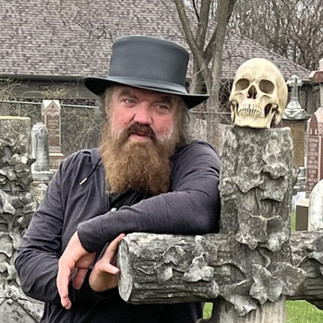“GOD OF THE DEAD” by Rosetta West
- Garcia

- Jul 30, 2025
- 2 min read

Rosetta West’s God of the Dead stands as a bold and unruly chapter in the band’s storied underground journey—a 15-track sonic pilgrimage that drifts between haunted landscapes and moments of defiant clarity. Rooted in the soul of Illinois blues-rock yet stretching toward something larger and more mythic, the album pushes beyond genre constraints, weaving together blues, punk, folk, psychedelia, and pure distortion into a raw, shape-shifting epic. Following the tight restraint of their prior EP, Gravity Sessions, this latest work sprawls outward with unshaken purpose. At the core is Joseph Demagore—founder, songwriter, and spiritual anchor. His voice, weathered and resolute, carries a weight that speaks across generations, anchoring tales that unfold more like invocations than conventional songs.
Whether enveloped in layered guitars or solitary piano, Demagore’s writing stirs a sense of spiritual unrest, probing mortality, memory, and the sacred woven into daily life. The rhythm section drives much of the album’s force. Drummers Mike Weaver and Nathan Q. Scratch trade roles across the tracklist, each bringing sharp contrast in approach. Guest drummer Caden Cratch injects intensity into the opening track, while longtime bassist Orpheus Jones offers a steady foundation throughout the journey. Louis Constant also joins for the final track, adding a cinematic gravity to its brooding close. Rosetta West embraces risk with intention. One track delves into folk textures and ritualistic cadence, another barrels forward with punk energy, while an elegiac piano ballad quietly suspends time. Even the instrumental centerpiece pulses with purpose, acting as an eerie interlude between realms.
Despite its expansive scope, God of the Dead never loses emotional cohesion. Each track feels like a deliberate step further into a terrain carved by loss, rebellion, and a longing for transcendence. The album’s strength lies not in uniformity, but in its devotion to storytelling and emotional truth. This isn’t an easy or passive listen. It asks for attention, for stillness, for full presence. Rosetta West refuses to conform to sonic trends or molds. Instead, They offer something elemental—a musical ritual, forged in fire and soul, that leaves a lasting impression well beyond the listening experience.
Garcia Penned 🖊️

















Comments